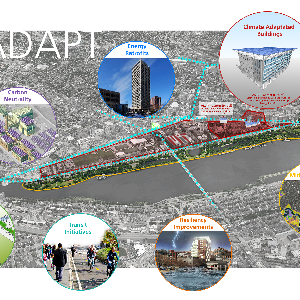
MIT 2050 - ADAPT (Alumni Driven Adaptation Policy & Transition) Center by Architerra/MIT 2050
Please find below the
Finalist Evaluation
Judges'' comments
Judge 1:
Much improved write-up but this proposal still tries to be all things to all people without a grounding in the cost of what they are proposing and the political and human capital required for success. The authors would be better served to make the concept more focused and more doable. They have created unintended consequences by recommending roads in Cambridge that would need to be 6 lanes wide to accommodate all the separate, exclusive kinds of traffic and trains through Cambridge delivering biomass fuel to MIT that come from the "forests of northern New England".
They have complicated their offering by establishing their home in one building and then moving several years later.
The ideas about what MIT should consider as possible projects during campus retrofits are extensive and complete The authors have done a good job in conveying what concepts are possible but the tone of the piece is somewhat arrogant. I would rather have seen the authors take a more supportive role rather than a demanding tone.
Judge 2:
The description of the 7 Resiliency Interventions was very informative and very well thought out, but it triggered the question of how the Interventions dovetail with MIT's current plans for the campus.
Most of this proposal is focused on sketching out what these interventions would entail. Only a small portion of the proposal addresses alumni involvement, which primarily is through an Alumni Advisory Council. How many alumni would this engage?
The proposal seems more focused on a specific slate of changes to the campus than on harnessing the power of MIT's Alumni.
Semi-Finalist Evaluation
Judges'' ratings
| • | Novelty: | |
| • | Feasibility: | |
| • | Impact: | |
| • | Presentation: |
Judges'' comments
Judge 1:
Excellent analysis and forward looking proposal. This proposal would fit perfectly into MIT’s current plans for a sustainable campus. Enlisting the MIT Alumni to become productively and actively involved in the effort is a powerful idea. The main entity to push this forward alongside the alumni would be MIT’s Office of Sustainability.
Judge 2:
While setting up a new center on-campus dedicated to yet another global challenge lending itself to multi-disciplinary research is not a new idea, it may be a worthy one if approached correctly.
The feasibility is doubtful in two areas:
1) You have blithely suggested a new building and the attendant fundraising without any idea whether this would fit into MIT's already identified building needs for campus. Fundraising is not as easy as it sounds!
2) Putting alumni in charge of a project that affects major campus investment decisions violates the governance of MIT and the role of the MIT Corporation. Alumni can certainly be in an advisory role but not a role allowing them to dictate actions for spending MIT's money.
The impact to the campus, Cambridge, and other cities facing rising waters could be substantial if you concentrate on developing technologies and using MIT as a testbed.
The proposal is clearly written but I do have several suggestions for improvement:
1) Remove all references to "led by an Alumni Council. Instead consider having an Alumni Advisory Council that plays an active role in identifying promising areas of research and works closely with faculty on an equal basis to determine what activities are supported by the ADAPT Center.
2) Your timing may be too ambitious for a new building since MIT is embarking on a major initiative to re-invent Kendall Square. Perhaps you should investigate whether your demonstration building could involve projects in the new buildings planned for Kendall Square as Phase 1 and a dedicated building in Phase 2 after the new Kendall Square improvements are funded. That is reality.
3) Your transit ideas are fine but how do you plan to convince Cambridge and the MBTA to go along? They would foot the bill for these changes and they are not known for their excess supply of money. Perhaps you should add information on how you plan to work with them to gain their trust and support for your ideas first.
 Dan Arons Mar 7, 2016 05:23 | Proposal creator Summary of Changes made in Semi-Finalist Round: Text Changes: We agree with Judge 1 that enlisting MIT Alumni to work in partnership with the Office of Sustainability toward completion of the ADAPT Initiatives is a powerful idea. The vision provided in our proposal crosses a multitude of disciplines (planning, real estate, law, policy, research, transportation, architecture, technology, etc.) all of which are necessary and integral to adapting the campus (and our world) to the effects of climate change. MIT Alumni represent the best and brightest in the world across these disciplines and if harnessed, could produce the most positive response possible in the face of this crisis. The text was revised with this point in mind. Comments from Judge 2 remind us that “business as usual” is not enough to tackle this challenge; prompting our rework of the ideas for resilient intervention #1. One single building exemplar, as originally envisioned, suffered from a bit of tunnel vision in the face of significant ongoing capital improvements planned for Kendall Square. Indeed, all new campus construction – whether currently in the planning stages, or further down the road, should be designed for sustainability and resiliency. Rather than building one single building exemplar, MIT should make the entire Kendall Square Initiative an innovative resilient district. We accepted and reworked the organization of the ADAPT Center to be advised by (not directed by) an Alumni Advisory Council. Harnessing the collective strength of the Alumni is our focus; we had no intent to suggest violation of the governance of MIT through our proposal. Lastly, we re-worked the ideas around transit improvements to fuse with the Kendall Square Initiative and use the currently planned street / connection improvements as model for longer term discussion with Cambridge and the MBTA. Graphic Changes: To support the ideas reinforced by the Judges’ comments, we revised the two initial graphics and added a third to convey the concept of the ADAPT Center inserted into the Kendall Square Initiative developments with a phased approach to the development of resiliency strategies. |
 Dan Arons Mar 7, 2016 06:18 | Proposal creator Higher resolution versions of the graphics for this proposal may be found at the following link:
|